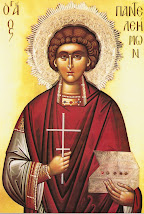Today it is the Day of St. Panteleimon, Patron Saint of our Church and Community. In the morning we had in our Church an Episcopal Divine Liturgy. His Grace Bishop Athanasios of Tropaiou had presided over the Holy Service. After the Church Service members of our Community had prepared BBQ for the whole congregation.

St Panteleimon was a medical doctor and was born in A.D. 275 in Nicomedia, Asia Minor, of a pagan father and a Christian mother. From his father he derived a profound intellect; from his mother, spiritual awareness. Of handsome appearance and noble bearing, Panteleimon was an impressive figure while still a student of the Empire's most noted physician, Euphrosinos, a teacher who took pride in his pupil's remarkable skill and dedication. He had not been a physician long when his reputation as a healer drew him to the attention of Emperor Maximilian, who encouraged him by his personal sponsorship. This quickly led to Panteleimon's recognition as the foremost physician of the entire known world.

Panteleimon became a familiar figure among the people as he went from one patient to another while yet serving the emperor and his court. The demand for his services kept him working at a feverish pace, an exhausting obligation he never shirked.

In the course of his rounds he had been observed by the pious Christian Ermolaos, one who remained in constant hiding in fear of persecution by the state for his overt promotion of Christianity. Ermolaos managed to intercept Panteleimon, whose great skill he lauded but who he thought needed to be reminded "from the Most High cometh healing." After a series of meetings the physician came to know his true Christian destiny, and thereafter his professionalism, as a man of medicine was subordinated to his role as a healer in the name of the Greatest Healer of them all. His power of healing was not attributable to a physician's skill alone, but to divine intervention as well.

As his reputation grew, Panteleimon came to be known more as a man of God than of science, an acknowledgement that brought wrath and cruel action by the emperor. After being given the customary interrogation Panteleimon was offered the ultimate choice between Christ and the idols; his response was a reaffirmation of his Christianity. For the noble physician it was a two-edged sword: first because he was a fallen favourite whose betrayal was a personal rebuke to the emperor, and second because of the steadfastness of his loyalty to the Saviour.

Not all of the fiendish designs of Panteleimon's torture are known, but history tells us that this honourable doctor and noble Christian was, among other things, stretched across a rack and burned by candles. Following this ordeal he was cast first into a fiery pit and then into a den of beasts. When he survived, the pagans were convinced he had the protection of some kind of sorcery.
It was finally decided that since there could be no antidote for drowning, he would be cast into a deep river with a huge stone bound to his body. When the stone proved buoyant, the exasperated torturers fished him out of the water and placed him on the execution block where he was beheaded. It was said that not blood but milk flowed from the severed head of the martyr. St Panteleimon gave his life for Christ on 27 July 304 AD.





















































































